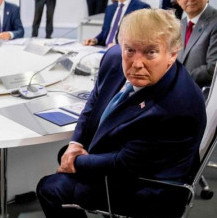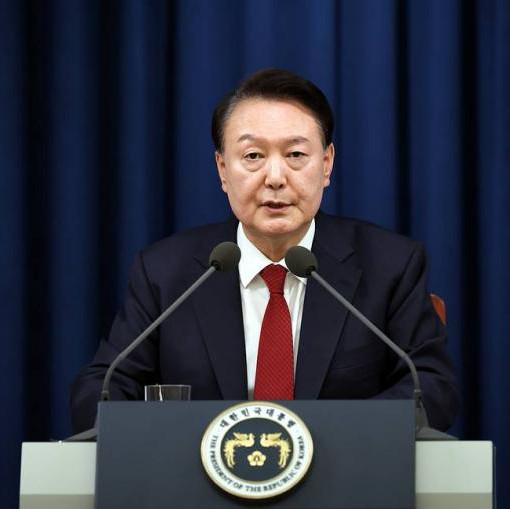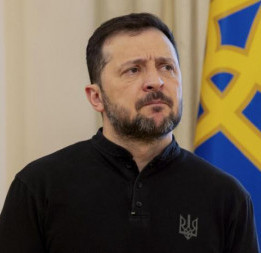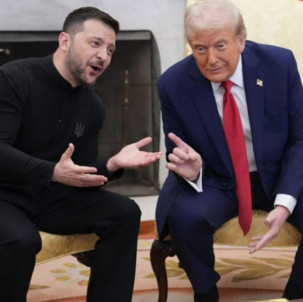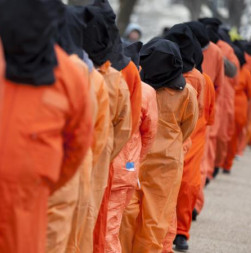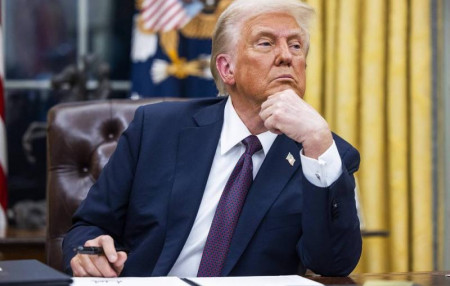
- Press review: US suspends USAID aid to Central Asia while Hamas visits Moscow again
- Press review: US urges elections in Ukraine as Trump enforces tough import tariffs
- Press review: NATO increases defense spending as Russia-Germany trade turnover falls
- Press review: Kiev may lose military aid while Trump
Donald Trump’s plans could push the entire world into an era of star wars; a Russian delegation visits Syria for the first time since Bashar Assad’s ouster; and a political crisis deepens in Serbia. These stories have topped Wednesday’s newspaper headlines across Russia, according to TASS News Agency.
Media: Trump's plans may plunge the world into a new era of star wars
The US plans to create a missile defense system that President Donald Trump has called the "Iron Dome for America." The plan includes the deployment of yet-to-be-developed interceptors in space, as well as the fast-tracking of the Hypersonic and Ballistic Tracking Space Sensor layer, Vedomosti writes.
In his executive order, Trump invoked the Ronald Reagan-era Strategic Defense Initiative, which aimed to develop a space-based missile defense system. The Strategic Defense Initiative remained active after the Soviet Union collapsed in 1991. Its supporters argued for maintaining the system by citing threats from so-called rogue states. However, in 1993-1994, the Clinton administration revised the US strategic defense doctrine, shifting focus to ground-based missile defense systems, ultimately leading to the initiative’s dismantling.
The US possesses the capacity to establish a large-scale missile defense system, but it offers little promise in terms of protecting the entire country, Igor Shkrobtak, senior researcher at the Russian Academy of Sciences’ Institute for US and Canadian Studies, said. "Not a single missile system is capable of fully neutralizing a massive missile launch. What Trump has said seems more like a negotiation tactic, even though certain signs suggest a potential militarization of space," the expert noted. He stressed that satellites and space debris would hinder the effective operation of a hypothetical space-based missile defense system.
It’s impossible to cover the entire US against advanced nuclear weapon delivery systems, but localized defenses could be arranged by combining various weapons and intelligence assets, Dmitry Stefanovich, an expert with the Center for International Security at the Russian Academy of Sciences’ Institute of World Economy and International Relations, observed. He did not rule out that since the current US administration views the Reagan-era Strategic Defense Initiative as a factor that made Soviet leaders more flexible in strategic stability talks in the second half of the 1980s, it might be seeking to replicate the strategy. "However, this approach is overly simplistic. I think we will see a further escalation of tensions," Stefanovich noted.
"It seems that Trump aspires to follow in Reagan’s footsteps, but his initiative will likely meet the same fate. It will be very difficult to implement. Apart from the immense costs, the problem is that today, no technology exists to effectively intercept hypersonic missiles capable of maneuvering mid-flight. Such technologies are unlikely to emerge anytime soon, while all Trump has is four years," retired Lieutenant General Viktor Yesin, a military expert, told Kommersant.
Vedomosti: Russian delegation visits Syria for first time since Assad’s ouster
A Russian government delegation led by Deputy Foreign Minister Mikhail Bogdanov and Special Presidential Envoy for Syria Alexander Lavrentyev arrived in the Syrian capital of Damascus on January 28. This marked the first such visit since President Bashar Assad’s government collapsed on December 8, 2024, and he fled to Russia seeking asylum, Vedomosti notes.
According to media reports, the delegation held talks with Syria’s current leader Ahmed al-Sharaa, also known as Abu Mohammed al-Jolani, the head of Hay'at Tahrir al-Sham (designated as a terrorist organization and banned in Russia). Bogdanov said that the cordial nature of relations between the two countries was reaffirmed during the negotiations. The Russian diplomat added that the issue of Russia’s military bases in Syria remains under discussion, and both sides agreed to continue consultations.
The Russian Aerospace Forces’ air base in Hmeimim was established in 2015 to combat terrorist groups, and a 49-year lease agreement was signed in 2017. A naval logistics facility in Tartus, originally built during the Soviet era, was expanded into a fully operational base in 2015, with a similar lease agreement finalized in 2017.
Russia’s dialogue with Damascus had stalled for some time, said Nikolay Sukhov, a senior researcher at the Center for Middle Eastern Studies under the Russian Academy of Sciences’ Institute of World Economy and International Relations. However, diplomatic efforts by Russian envoys remaining in Damascus paved the way for the delegation’s visit. "During the long pause, Damascus hosted delegations from Western and Middle Eastern countries, including officials from Turkey, a key backer of the new Syrian leadership," the expert noted. Russia-Syria cooperation is unlikely to return to its previous level under Assad.
According to Sukhov, the Hmeimim base remains a concern for NATO’s southern flank and serves as a critical asset in Moscow’s strategic rivalry with Ankara in Africa. As for the naval base in Tartus, its chances of remaining operational are higher because the new Syrian authorities are more neutral toward its presence, the expert added.
Moscow needs to determine which agreements with Syria can be upheld, Russian International Affairs Council expert Kirill Semenov explained. The majority of accords with Russia hold little value for Syria’s new leadership, as they are viewed as deals struck under Assad, the analyst remarked. However, despite their reservations about Moscow's backing of Assad, the new authorities still seek to maintain contact with Russia.
Media: Political crisis deepens in Serbia
Serbian Prime Minister Milos Vucevic has stepped down amid large-scale protests. A deadly roof collapse at a train station in the city of Novi Sad had earlier sparked demonstrations across the country, with protesters demanding that those responsible be held accountable. The country's authorities, who view the protests as a "color revolution" attempt, plan to create a new political movement to counter these activities. President Aleksandar Vucic has launched a major government reshuffle, but it is unlikely to quell the protests, said experts interviewed by Izvestia.
The social unrest stems from the government's failure to take the necessary measures in response to the deadly incident. This is why the government has lost the people’s trust, former Serbian lawmaker Zoltan Dani told the paper.
On the other hand, the authorities believe that the demonstrations are being orchestrated from abroad. This time, it’s not opposition activists but students and schoolchildren driving the protests, but they are largely coordinated through non-governmental organizations with close ties to Western intelligence agencies, RIAC program manager Milan Lazovic pointed out. The prime minister’s resignation may fuel the protests further, and the authorities will escalate their response. In such a scenario, a representative of the opposition could be appointed premier, or someone linked to the ruling circles but holding a pro-Western stance on certain key issues, Lazovic added.
The protest wave is troubling for Vucic but not a major threat, Yekaterina Entina, director of the Center for Mediterranean Studies at the Higher School of Economics, told Vedomosti. She expects that the premier’s resignation may somewhat defuse tensions. However, the prime minister’s departure renders the cabinet transitional, and the Serbian president will have to dissolve parliament and call a snap election unless lawmakers form a new government within 30 days.
Anastasia Meleshevich, a researcher with the Institute for International Studies at Moscow State Institute of International Relations, noted that no one is demanding an early election at the moment because the opposition's trust rating is almost as low as that of the government. The protests lack a political center so far, but they are becoming increasingly intense. Vucic will only be able to solidify his position if he takes on the corrupt elite, but his inner circle remains hostile toward the protesters, the expert concluded.
Rossiyskaya Gazeta: Chinese AI chatbot DeepSeek triggers US stock market slump
China’s artificial intelligence-based chatbot DeepSeek-R1 has surged to the top of the free app rankings in the App Store across multiple countries, leading to a sharp decline in the stocks of major tech companies. The market value of US tech giant NVIDIA plunged by almost $600 billion, Rossiyskaya Gazeta writes.
This market reaction stemmed from the fact that DeepSeek-R1 positions itself as a competitor to the US-made ChatGPT. According to data from the DeepSeek website, the R1 model delivers performance on par with OpenAI-o1, while its operational expenses are 20 to 50 times lower. Researchers claim they developed the open-source DeepSeek-V3 neural network for just $6 million—a remarkably low cost. The release of the DeepSeek-R1 chatbot has sparked debate among experts over whether US companies can maintain their technological edge.
Anton Razzhigayev, a researcher at the FusionBrain lab within the AIRI Institute of Artificial Intelligence, notes that while the inner workings and training process of OpenAI’s famous o1 neural network model remain unclear, it is now evident that there is no undisclosed 'secret ingredient' behind its capabilities—a realization made possible by competitors like DeepSeek.
The success of China’s AI model has dealt a serious blow to US President Donald Trump’s ambition to secure America’s global technological dominance. Investors are now questioning why they should continue betting on Silicon Valley firms that pour hundreds of billions of dollars into developing and marketing their products when a free alternative exists that is equally effective—if not better.
The key question now is whether the US will resort to forcing a takeover of its Chinese competitors in the tech sector, citing national security concerns as justification—a tactic previously used against TikTok. As the race for technological supremacy between Beijing and Washington intensifies, this scenario cannot be ruled out. However, experts stress that such an aggressive approach is unlikely to yield the desired results.
Nezavisimaya Gazeta: EU postpones ban on Russian liquefied natural gas
Europe’s plans to impose tougher restrictions on Russia have hit a delay. The European Commission has pushed back the adoption of a new strategy to fully phase out Russian fuel supplies until late March, with a particular focus on liquefied natural gas (LNG). Notably, the EU has significantly ramped up its LNG imports in recent years, Nezavisimaya Gazeta reports.
Russia’s liquefied natural gas exports surged to a record high of 33.6 million metric tons last year, with more than half purchased by European countries. Now, EU officials are drafting plans for a complete ban on Russian LNG supplies to the region. Since the start of the Ukrainian conflict, Europe has sought to reduce its reliance on Russian energy. Until 2022, the EU was Moscow’s largest gas customer. In 2021, Russian gas accounted for about 45% of the EU’s imports, with Moscow supplying over 150 billion cubic meters of gas annually. By last year, that figure had dropped to 30 billion cubic meters, half of which was still transiting through Ukraine.
After Kiev halted Russian gas transit in January 2025, discussions emerged about a potential resumption of supplies. One proposal involves routing Azerbaijani gas through Ukraine, but experts are skeptical about its feasibility.
Azerbaijan lacks surplus gas, Igor Yushkov, a leading analyst at the National Energy Security Fund and an expert at the Financial University under the Government of the Russian Federation, emphasized. "They are already exporting gas to Turkey and Europe. What remains is reserved for the spot market, as they cannot guarantee continuous supplies. Azerbaijan is already maximizing its gas exports to Europe," the analyst noted.
Freedom Finance Global expert Vladimir Chernov shares this view. "Under Azerbaijan’s strategic partnership agreement with the EU, the country aims to boost gas supplies to Europe by late 2027, reaching an annual level of 20 billion cubic meters. However, even with expanded exports, Azerbaijan cannot fully replace Russian gas," he stated.
Azerbaijani gas may still find its way to the EU, with the most viable option being to use existing Russian pipelines. However, such a move appears politically untenable at this stage, said Dmitry Alexandrov, head of analytical research at AVI Capital.
TASS is not responsible for the material quoted in these press reviews
